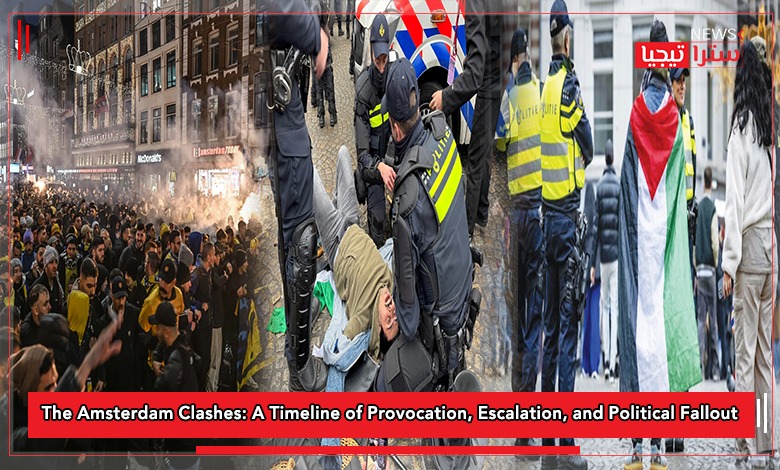International news section 18-11-2024
The violent altercations in Amsterdam surrounding the visit of Maccabi Tel Aviv soccer fans illuminated deep-seated tensions, laying bare broader socio-political divides. This article explores how the events unfolded, the factors that led to the clashes, and the aftermath, drawing upon primary sources, police reports, and political commentary, including analysis from Israeli politicians such as Ehud Olmert.
How It Began: Provocation in Amsterdam
The situation began with the arrival of Maccabi Tel Aviv fans in Amsterdam for a football match. According to local reports and eyewitnesses, several fans were seen chanting racist and inflammatory slogans, including “Death to Arabs,” and engaging in provocative acts such as tearing down Palestinian flags displayed by locals. Videos and testimonials also suggest that some fans attacked homes displaying Palestinian symbols, leading to heightened tensions in neighborhoods known for their diverse communities.
This behavior sparked outrage among local residents, particularly within Amsterdam’s sizable pro-Palestinian community. Residents and activists mobilized in response, organizing demonstrations and counter-protests against what they perceived as blatant provocations by the visiting fans. The anger escalated when reports surfaced of Maccabi fans jeering during a minute of silence held for victims of recent Spanish floods, further alienating them from local sympathies.
The Escalation: Violence Erupts
What began as verbal altercations quickly turned violent. Eyewitnesses and police accounts indicate that confrontations included physical attacks, hit-and-run incidents, and widespread vandalism. While some Israeli media outlets portrayed the fans as victims of an antisemitic pogrom, others, including Amsterdam councilman Jazie Veldhuyzen, countered that Maccabi fans initiated the violence. This included targeting homes and attacking taxi drivers.
Clashes intensified as local protesters confronted Maccabi supporters, leading to violent street altercations. Video evidence shows acts of aggression from both sides, but much of the focus remains on the fans’ provocative actions that triggered the unrest.
Police Response and Casualties
Amsterdam police struggled to contain the violence, which reportedly included numerous injuries, destruction of property, and several arrests. The full casualty count remains contested, with local reports suggesting that some injuries were severe. Dutch authorities have faced criticism for failing to anticipate the unrest despite warnings about Maccabi fans’ history of hooliganism and racist violence during international tours.
Political Fallout: Linking Events to Broader Issues
The events in Amsterdam resonate deeply within the broader geopolitical landscape. Ehud Olmert, the former Israeli Prime Minister, in a *Haaretz* op-ed, criticized both the Dutch authorities for their slow response and Israel’s domestic policies for fueling global tensions. Olmert argued that the growing international anger toward Israel stems not just from historic antisemitism but also from outrage over its treatment of Palestinians and its military operations in Gaza. He warned that such incidents could escalate into more significant threats to Israel’s global standing, emphasizing how its policies contribute to isolating it diplomatically.
The clashes in Amsterdam highlight the intersection of sports, politics, and international relations. While Israeli narratives often frame such incidents as antisemitic, alternative accounts reveal a more complex reality involving provocation and retaliation. The global reaction has been polarized, with many condemning the violence on all sides but pointing to Israel’s broader policies in Gaza and the West Bank as underlying factors for the hostility it faces abroad.
This narrative aligns with Olmert’s argument: Israeli policies, perceived as oppressive and violent, not only harm Palestinians but also provoke backlash globally, exacerbating tensions in host countries with significant Muslim populations. The Amsterdam incident thus serves as both a local tragedy and a microcosm of larger geopolitical dynamics.
Conclusion
The clashes involving Maccabi Tel Aviv fans in Amsterdam expose the deep fissures between communities, fueled by provocative actions and broader political grievances. They underscore the urgent need for addressing the root causes of such violence, including confronting systemic racism, ending cycles of provocation, and rethinking the policies that isolate Israel on the global stage. As Olmert warned, continuing down the current path risks further violence and a deepening diplomatic quagmire for Israel and its citizens.

